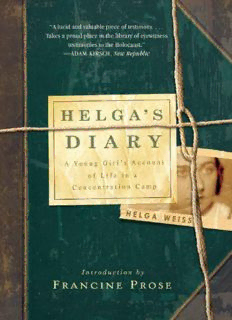
Helga's diary : a young girl's account of life in a concentration camp PDF
Preview Helga's diary : a young girl's account of life in a concentration camp
HELGA’S DIARY A YOUNG GIRL’S ACCOUNT OF LIFE IN A CONCENTRATION CAMP Helga Weiss TRANSLATED BY NEIL BERMEL INTRODUCTION BY FRANCINE PROSE DEDICATION To my granddaughters, Dominika, Natálie, and Sarah, and to all young people, in the hope that they will keep the past alive in their memories, and that they will never experience for themselves what my generation has had to live through CONTENTS Cover Title Page Dedication Maps Helga’s Journey Terezín Introduction by Francine Prose Author’s Note HELGA’S DIARY 1. Prague 2. Terezín 3. Auschwitz, Freiberg, Mauthausen, Home Interview with Helga Weiss Translator’s Note Glossary Illustration Credits Picture Section Praise for Helga's Diary Copyright INTRODUCTION I n The Lost, Daniel Mendelsohn’s powerful book about his search to discover the fate of six family members killed in the Holocaust, the author recalls a conversation with the mother of the novelist Louis Begley. Having impressed a listener with the amazing story of her escape from the Nazis, Mrs. Begley remarks, “If you didn’t have an amazing story, you didn’t survive.” She was right. The fortunate ones who survived the Nazi genocide had amazing stories. But the less fortunate ones, the ones who didn’t survive, also had amazing stories. In a sense, the perpetrators of the mass murder had amazing stories. More than half a century later it still seems amazing (just as it still should amaze us) that such a thing could have happened: that millions of innocent men, women, and children could have been murdered by the Nazis’ remarkably efficient killing system, in broad daylight and with the full knowledge of so many. The further these horrors recede into history, the fewer the living witnesses who remain to provide us with firsthand accounts, the more important —the more essential—it is for those amazing stories to continue to be told. Helga’s Diary also tells an amazing story, one that has never been told quite this way before. Helga Weiss’s narrative begins in 1938, in Prague, just before the German invasion of Czechoslovakia. In the innocent, straightforward voice of the bright, middle-class schoolgirl she was, Helga describes the events that followed the Nazi occupation. As in the other countries that came under German rule, a series of increasingly harsh and punitive laws were passed, designed to demoralize, humiliate, and make life impossible for Jewish families like Helga’s. First playgrounds, movies, and parks were declared off limits. Ultimately these restrictions began to seem almost inconsequential compared to those that would follow; eventually Helga was forbidden to attend the state school, which until then she had loved. Helga accepts the changes, the way a child does, the way the adults around her are forced to do. She goes to an improvised Jewish school and spends the summer in hot, dusty Prague, because Jews are forbidden to travel beyond a short distance from their homes. She makes new friends, meets other children with whom she goes to the Jewish playground. They sew yellow stars onto their clothing and try to wear them proudly, so as not to let the occupiers think that their brave spirits have been broken. Late in 1941, as Helga describes it, the Jews begin to hear rumors about transports that will relocate them somewhere . . . but where? There are elaborate preparations for departure, and in December 1941 Helga and her parents are taken to Prague’s Trade Fair Palace and from there to the Terezín concentration camp, not far from the city. What makes Helga’s diary so interesting is the sensibility of the girl she was at the time and the girl she is remembering in the sections she wrote later: a feisty young person who could very rapidly and sensibly adapt to any change, however dramatic or drastic. From her early years, she seemed to want, and to have a gift for establishing, a sense of normalcy and order; she clearly believed in the importance of remaining optimistic and of making the best of a bad—in this case, a very bad—situation. What’s startling, throughout, is the resilience with which her buoyant spirit keeps bobbing up past the hardships, indignities, and cruelties that are part and parcel of the new routines imposed on her by the changing laws of her captors and the whims of her guards. “In any event,” she writes of Terezín, “there’s no reason for crying. Maybe because we’re imprisoned, because we can’t go to the cinema, the theatre or even on walks like other children? Quite the opposite. That’s exactly why we have to be cheerful. No one ever died for the lack of a cinema or theatre. You can live in overcrowded hostels . . . on bunks with fleas and bedbugs. It’s rather worse without food, but even a bit of hunger can be tolerated. . . . They want to destroy us, that’s obvious, but we won’t give in” (94). Whatever happens, it’s Helga’s life, and she is determined to live it. One can’t help feeling that her talent for finding solutions and resisting despair, as well as the joy she took in small victories, must have in some way contributed to her survival. Likewise, the highly unusual and fortunate fact that she was able to stay with her mother throughout their captivity and in their horrific odyssey from camp to camp strengthened both her resolve and her will; there was nearby, at every point, someone she loved and who loved her, someone beside herself to live for and for whom it was necessary to remain strong. The irony is that this girl so determined, despite everything, to lead a convincing semblance of a normal life was sent to Terezín, the camp that was designed to fool the world into thinking that the Jews were leading quasi-normal lives, that they were being treated in a humanitarian way and with all the
Description: